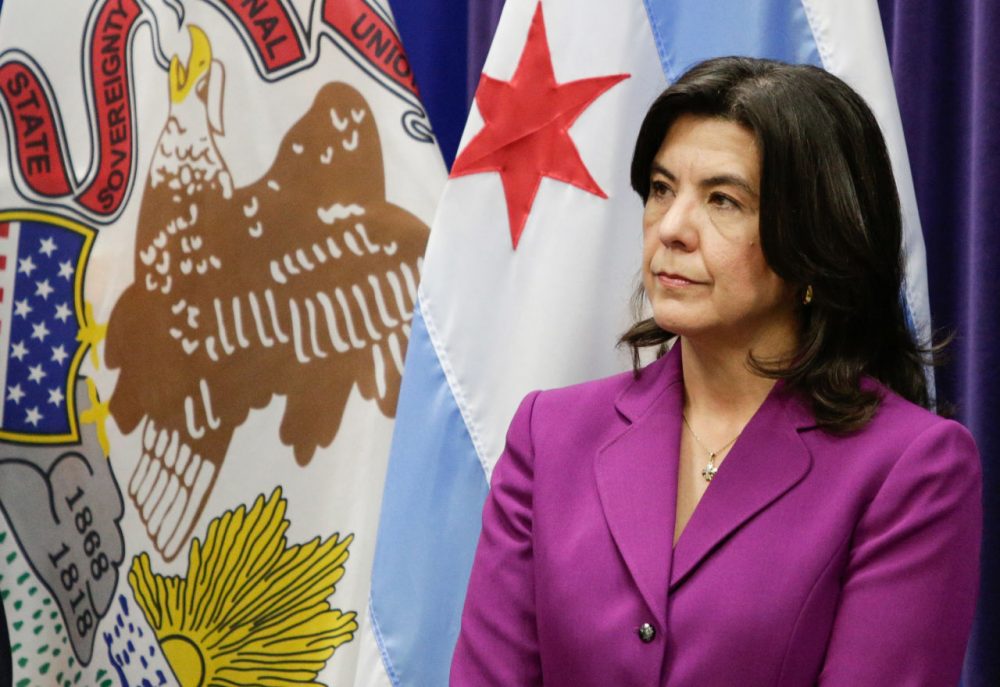Advertisement
After Police Shootings, Prosecutors Defeated In Chicago, Cleveland

Voters in Chicago this week ousted prosecutor Anita Alvarez, who has been under fire for taking more than a year to charge a white police officer in the shooting death of Laquan McDonald, a black teenager.
Also this week, voters in Cleveland rejected Tim McGinty, the prosecutor who declined to indict the officers in the killing of 12-year-old Tamir Rice.
Law professor Justin Hansford tells Here & Now's Robin Young that Black Lives Matters activists see local politics as one way to effect change.
Interview Highlights: Prof. Justin Hansford
In Cleveland and Chicago, was getting rid of prosecutors through the ballot box a political action?
“There’s a long history of activists holding prosecutors accountable for some of these harms done to the community. It goes back to when Fred Hampton was assassinated in 1969. Activists organized to oust the DA, Hanrahan in that case... That was in Chicago. It’s part of a long legacy, both in Chicago and in Cleveland. There were activists who were canvasing, they were out there doing phone banking, they were doing protests. They were working on these campaigns for a good amount of time in each case for both Alvarez and McGinty, and so there was definitely a part of strategic and organizing process, which I was really happy to see was one that involved a lot of coalition building and collaboration between BYP100 and the Ohio Student association in Cleveland.
BYP100, that’s Black Lives Project.
“Right, Black Youth Project 100 in Chicago and in Cleveland, Ohio Student Association is another group that has been at the forefront of a lot of Black Lives Matter’s organizing in both of those cities.
Jay McDonald of the Ohio Fraternal Order of Police said 'a very real concern about a trend across the country of big pressure to pervert the rule of law to satisfy activists.'
“First of all, the whole point of electing prosecutors is to make prosecutors accountable to local communities. This sends a message that accountability is for everyone, including prosecutors.”
On the accusation that some prosecutors, including Robert McCullough with the Michael Brown case, 'get cozy' with local law enforcement and it affects how they prosecute
“That was a case, of course, that was very close to my heart. I always told people, I’m a lawyer and I’m a law professor and I see this as my calling, and it hurts so much to see the thing that I have dedicated my life to perverted and used to criminalize a community through the war on drugs, and now to allow these terrorist acts, of the killing of unarmed civilians to be shielded from accountability, and when you talk about Bob McCullough in that case, he was re-elected through, if you look back at those facts, he had a process where he drew out the investigation past the time of his election, so his decision not to indict came after the reelection had already taken place. I’m sure that if he had made that decision before, a month or even two months earlier, then we would have had the same sort of move to oust him as well. That’s the process of manipulation of this prosecutorial function that causes people to lose faith in the system. It really broke my heart to see prosecutor McCullough take that approach.”
Advertisement
On looking forward and the idea of community-based prosecution
“You know, 95 percent of elected prosecutors around the country are white, 83 percent are men, only 1 percent are women of color. So there’s the question of who we put in these positions in the first place and it’s not enough to just say that we are going to involve more people in the process of over-criminalization. We have to engage in a decriminalization process and, with prosecutors, prosecutors hold most of the power in our criminal justice system. They by themselves decide whether there is diversion, they decide whether or not there is going to be a plea deal, they decide whether or not they are going to bring a charge that’s going to be a charge with a high mandatory minimum or a high amount of time that will be served. Prosecutors have arguably more power than judges in our system today, and so these prosecutors are supposed to be helping to keep us safe and to make the community feel safe, and if the community is being terrorized, and not just by criminals but by criminals with badges, it’s the prosecutor’s duty to make sure those people are held accountable too.”
Guest
- Justin Hansford, law professor at St. Louis University and an adviser for Black Lives Matter activists. He tweets @Blackstarjus.
This segment aired on March 17, 2016.